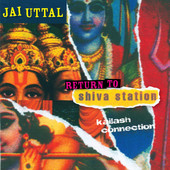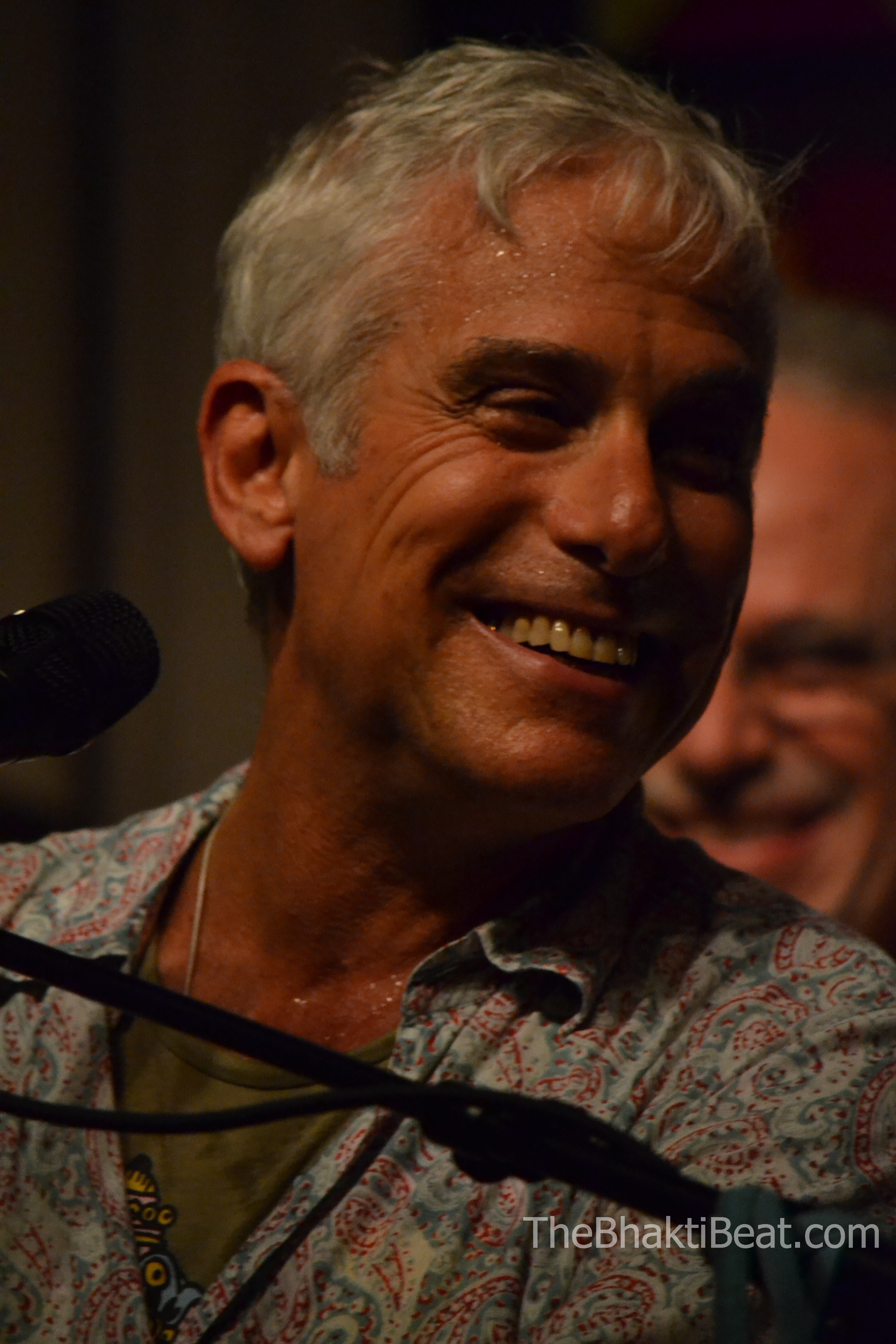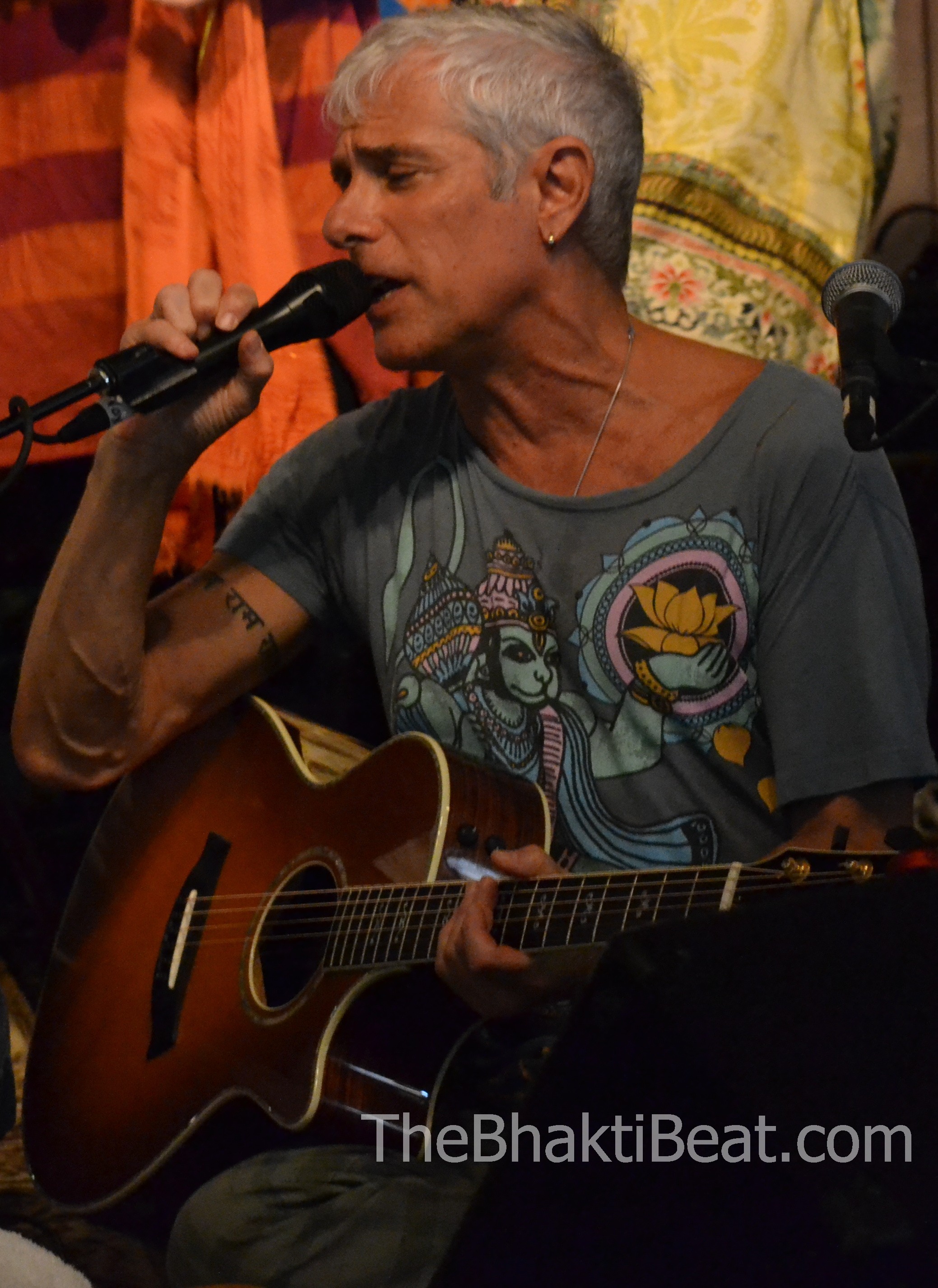 With “Return to Shiva Station,” Jai Uttal travels back in time to a period of his life when his musicality was exploding but his personal life was imploding — and emerges with a CD that is more a vision of where he is heading, musically and perhaps personally, than a rehash of where he has been. It’s a softer, gentler side of Jai — one that is rarely seen at big festivals like Bhakti Fest and largely unseen on his discography of 16 releases. Until now that is.
With “Return to Shiva Station,” Jai Uttal travels back in time to a period of his life when his musicality was exploding but his personal life was imploding — and emerges with a CD that is more a vision of where he is heading, musically and perhaps personally, than a rehash of where he has been. It’s a softer, gentler side of Jai — one that is rarely seen at big festivals like Bhakti Fest and largely unseen on his discography of 16 releases. Until now that is.
“Return to Shiva Station” can hardly be called a remake. Rather, it is a completely new incarnation of its namesake and inspiration, “Shiva Station,” which was released in 1999. While the track list on “Return” mimics the original “Shiva Station” song for song, the two albums could not be more different. Where “Shiva Station” is loud and exuberant, “Return” is quiet and understated. Where “Shiva Station” is multi-layered and unrestrained, with lush instrumentation from an extravagant 11-piece band (The Pagan Love Orchestra), “Return” is pretty much Just Jai, mostly solo and unplugged. Where “Shiva Station” was “bursting through the heavens,” in Uttal’s words, the new album looks inward.
The difference is by design. When his current record label, Sounds True, asked him to do a remake of “Shiva Station,” Uttal said his first response was: “Why?” With more than a little cajoling from the label and his manager, Steven Saporta, he reluctantly agreed to try his hand at reinventing the opening track, Guru Brahma. “I said, if I’m going to do this album – I still wasn’t committed – but if, it’s got to be really different,” he told The Bhakti Beat.
It’s as if Uttal took each song, ripped it up in shreds, stripped it of all excess, and then rebuilt it in a minimalist fashion that reduces each to its elemental beauty, revealing the soul of the song. It’s Jai Uttal, vocalist and one-man band, stripped down and naked.
The first thing he did was eliminate the drums.
Every other album Uttal has done was very rhythmic, he said, with drums and percussion setting the beat. So he threw those out. The vibrant horn section that blasts through “Shiva Station” is also nowhere to be heard on “Return.” Instead, strings take center stage, a reflection both of Uttal’s long-time prowess with Indian stringed instruments and his newfound fascination with Brazalian-style guitar. (His teacher and mentor in Brazilian guitar, José Neto, who has toured with the Allman Brothers, Steve Winwood and Rod Stewart, plays on almost every track.)
“Most of my albums are very orchestrated — lots of music and lots of instruments. On this one, the production is very simple — not simple-minded, but less orchestrated. Because of that my voice is much more naked,” Uttal said. “I couldn’t cover it up with a horn section or a drum set,” he added with a self-effacing laugh, pointing out that he has “always struggled with a lot of insecurity” about his voice.
 The distinctive Uttal voice is indeed the focal point of “Return to Shiva Station,” supported here and there by back-up vocals by long-time collaborators Ben Leinbach, who also mixed and co-produced the disc, and Prajna Vieira, one of Uttal’s most consistent response vocalists. But it is the strings that stand out on this disc more than anything. José Neto is everywhere with his masterful Spanish-style strumming, but there is also cello by Yoed Nir, sitar by Timothy White, bass by Leinbach, and Uttal on guitar, banjo and the single-stringed Indian ektar.
The distinctive Uttal voice is indeed the focal point of “Return to Shiva Station,” supported here and there by back-up vocals by long-time collaborators Ben Leinbach, who also mixed and co-produced the disc, and Prajna Vieira, one of Uttal’s most consistent response vocalists. But it is the strings that stand out on this disc more than anything. José Neto is everywhere with his masterful Spanish-style strumming, but there is also cello by Yoed Nir, sitar by Timothy White, bass by Leinbach, and Uttal on guitar, banjo and the single-stringed Indian ektar.
Mad for the Banjo
Uttal’s love affair with strings goes all the way back to when he was a young preadolescent living in New York City, he told us. That’s when he first discovered the banjo, after losing interest in his early piano lessons. “I was completely mad for banjo,” he said. “It was my first real love music-wise. Playing banjo was the first time that I felt sort of an inner peace…It still holds a super fondness for me.”
If you’ve ever seen Uttal pull out his banjo at a live kirtan, you know how he lights up when he gets that instrument in his hands. “Rustic banjo” (Uttal’s words) makes appearances in two songs: “Corner” and “Jaya Jagadambe” – which happen to be two of Uttal’s self-professed favorites on the disc. Still, it’s the Brazilian guitar that has Uttal currently enamored, and that is his favorite part of the CD.
He’s been studying it with Neto – whom he calls his “current idol” – and is completely in love with the chord progressions and distinctive style of the Brazilian interpretation of guitar, which encompasses bossa nova and samba. “For the last bunch of years I’ve been finding such joy and challenge and, you know, yearning in studying Brazilian guitar,” he said.
He committed himself to approaching the reinterpretation of “Shiva Station” with a new perspective as an acoustic guitar player, and particularly from the Brazilian perspective. “The Brazilian harmonies are so rich and so deep. Having spent most of my life involved with Indian music…you know, Indian music is not harmonic; it’s melodic. There are no chords in traditional Indian music. So here I was taking these melodies and wanting to put beautiful chords behind them.”
Uttal said the process was hard on a lot of levels.
 On a technical level, he said: “Every single song was on the absolute edge of my technical ability. Going to the studio was hard. I couldn’t play my own songs!”
On a technical level, he said: “Every single song was on the absolute edge of my technical ability. Going to the studio was hard. I couldn’t play my own songs!”
The voice of self-doubt started “raging,” he said, reinforcing his reservations about revisiting Shiva Station. “I started to think that I should have waited for six months and just practiced these chords.”
But “Return” presented a challenge not just for the technical aspects, but for the emotions that it raised as well. Uttal has described the period of his life when “Shiva Station” was produced as unhappy, out of balance, and very difficult. He told us he was at the end of a period of drug addiction and alcoholism (“the end is always the worst”) and was in a “very, very toxic relationship.” Moreover, he was frustrated spiritually and musically, having put all of his creative energy into getting the Pagan Love Orchestra off the ground, and feeling that is was still mired in obscurity.
None of which, by the way, comes through in “Shiva Station.” Having discovered it anew because of “Return,” we have to say we didn’t find it depressing at all. Quite the opposite in fact. It’s a happy CD, filled with over-the-top joyousness and big-band elation. We would never have guessed that this came from a severely depressed man in the throes of addiction and a miserable marriage.
And that, my friends, is the point….
“As we sing kirtan, as we express ourselves, there are so many emotions that come out,” Uttal said. “The bigger the palette of emotional colors that is expressed, the more joy comes through it all. So as we’re expressing ourselves, sadness comes out, despair comes out, a longing comes out, an incredible ecstasy comes out. In the end you feel so happy, because nothing is withheld.”
Buy “Return to Shiva Station: Kailash Connection” Listen to “Shiva Station” Jai Uttal’s Website Jai Uttal’s Facebook page








Thank you for visiting Camilla, great to see you here! Yoga lialtrley saved my life many years ago. I’ve let my practice slip but have set the intention to start it back up. I hope you find a class you love, it could take a few tries to find a teacher you really connect with. Much love and gratitude to you!